Allen Page.. David Segue.. Edward Brazile.. Vernon Winslow.. George McDemmond
In 1948 and 1949, The Louisiana Weekly newspaper ran a column entitled “Personality of the Week.” Each week, an outstanding person of color was chosen who achieved success in such fields as education, business, science, or sports. Many were among the first to break the color barrier, but all engaged in civic activities and were examples of individuals who gave back to the community. Below are just a few of these stories. Others, including women, will be presented in future articles.
Allen Page
Before Jackie Robinson broke the color barrier, the Negro Leagues were the only means by which black ballplayers could engage in professional baseball. America was crazy about baseball, and the black community was no different. New Orleans most prominent baseball team owner and sports promoter was Allen Page. Sometimes called “the Ebony Mike Jacobs of the South” Mr. Page left no stone unturned and was determined to give the New Orleans public the best that baseball had to offer. He knew that if he presented a professionally run team, many local black baseball fans would attend.
His team was named the New Orleans Creoles and he entered them into the Negro Southern League which played games against the Negro Northern League. One of Page’s most notable achievements was the creation of the annual North-South All-Star Game of 1939 which took place here in New Orleans and brought dozens of black national baseball superstars to the city. By 1947, the New Orleans Creoles were playing their home games in Pelican Stadium (a stadium once reserved for only whites) on the corner of Tulane and South Carrollton Avenue. He succeeded in bringing nationally known players to the city and was also known by many as the owner of the Page Hotel located at 1038 Dryades Street. It was here where all local and national baseball players were housed and fed since they weren’t allowed to enter white hotels and restaurants. For these contributions, Allen Page was saluted as “Personality of the Week” on October 15, 1949.
David A. Segue
By 1949 David A. Segue had been the projectionist at the Lincoln Theatre for the past 25 years. At one time he was the only colored projectionist in New Orleans, but through his efforts (that same year) there were now Negro operators in every colored theatre in the city, all of whom eventually became members of the union of which Mr. Segue was president. Breaking through that “lily white” occupation was not an easy task.
Aside from his career as a projectionist, David Segue (a native of Shreveport, Louisiana) was also a teacher at Booker T. Washington High School. It was here that he headed the Biology Department in 1949 and was the technical advisor to the school in visual arts. From 1942-1949, he was the directing manager of Booker T. Washington’s operettas and, by that time, had been in the public school system for 20 years.
Aside from the above duties, he still found time to be actively involved as a member of Phi Beta Sigma Fraternity, Bunch Club, NAACP, YMCA and Mt. Zion M.E. Church. He was a graduate of McDonogh #35, New Orleans University and did advanced course work at Straight and Dillard University. He was chosen “Personality of the Week” for the November 27, 1949 issue.
Edward Brazile
To many of his friends and acquaintances, Edward Brazile was affectionately known as “Frenchy”. As head maintenance man at the Times-Picayune Publishing Company for the past 30 years, Mr. Brazile volunteered to serve on the toy and doll committee, raising money so that needy children could receive gifts at Christmas time. For 28 years he was a fixture serving in this capacity by making Santa Claus a reality to the many underprivileged boys and girls in the New Orleans area.
He was also president of the New Orleans Athletic Association in 1949 and its treasurer for the past 25 years. Through his efforts, the association staged a benefit football classic each year as a fundraiser for city kids.
He was a coach of the Scrubs football team and was known to be one of the first to meet Joe Louis at the train station upon the fighter’s first trip to New Orleans. He was a graduate of Bienville Elementary (which became Albert Wicker) and Straight High School. For the above reasons, Mr. Brazile was the “Personality of the Week” for the December 31, 1949 issue of The Louisiana Weekly.
Vernon Winslow
By 1948, Vernon Winslow was a talented young artist-instructor at Dillard University and radio script writer. Determined to break into a business that didn’t want him, Professor Winslow mailed scripts he’d written to local radio station WJMR. Since they were unable to ignore the high quality of his writings, the station hired him, but then wouldn’t let him on the air.
He eventually would teach a white disc jockey how to fake a black accent and dialect on air and (by 1950) would be hired by the Jackson Brewing Company in their public relations department. Here, he invented his persona, “Dr. Daddy-O” that would set the standard for black DJs to follow. He would soon become the first black radio announcer in the city of New Orleans.
As an instructor of fine arts at Dillard University, he was an inspiration to the young people who found their way to his classroom. At the request of psychologist Charles E. Thompson, Mr. Winslow was asked to revise pictures that were used for testing personality traits of white persons so as to make it possible to use the pictures for similar testing of Negro students. This resulted in the first psychological test developed for application among the colored population. For his contributions, Mr. Winslow was selected as “Personality of the Week” for October 30, 1948.
George McDemmond
In its November 6, 1948 issue, The Louisiana Weekly spotlighted George McDemmond for his successful business skills and civic involvement in his community.
Mr. McDemmond began making potato chips on his kitchen stove and selling them to a few of his neighbors. Lack of space forced him to move to a larger location, so he moved from his own kitchen to his mother’s home, and shortly thereafter to Orleans Avenue where he remained until June of 1948.
From the manufacture of potato chips, Mr. McDemmond soon branched out into the manufacturing of peanut butter wafers, pigskins and other meats. By 1948, he was believed to be the only Negro operating a meat plant under the direct supervision of the U.S. Department of Agriculture. His plant, which went under the title of Community Essential Company, was able to send meat products to any portion of the United States. He set up feeder plants in such cities as Chicago, Detroit and Buffalo.
Located at 3923 Melpomene Street, Community Essential Company’s payroll listed 42 employees and was a perfect example of the type of business that people of color needed to develop and support. He was one of the founders and 1st president of the New Orleans Business League and a member of the Colored Educational Alliance. George McDemmond’s achievements were highlighted in the November 6, 1948 edition of The Louisiana Weekly.
Sources: The Louisiana Weekly, May 10, 1947 + see dates listed above. www.louisianaweekly.com/making-the-music-spin-in-new-orleans
Lolita Villavasso Cherrie
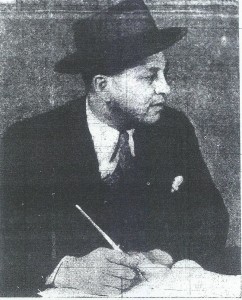
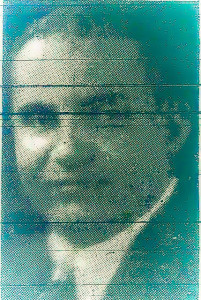
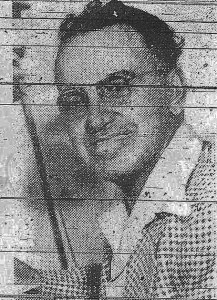
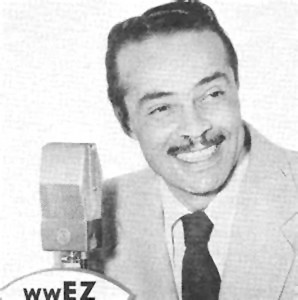
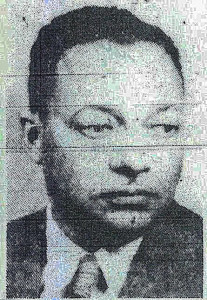



Thank you for once again adding yet another piece to the to the magnificient tapestry that is the collage of Black history in NOLA. Mr./Dr. Winslow was a very kind gentlemen and teacher at DU during my years (’66) there. I can remember his intonations with that rich baritone voice that he was blessed with. If daughter Leslie is still kicking I wish you many blessings.
What a surprise to see my father’s picture, Allen Page, in this current edition. I continue to be inspired by the work of the entire Creole Gen crew as you persevere in giving faces and voices to the rich lives and heritage of our ancestors. Their stories live on through your great work! Lolita, thanks for including my father who, along with all of the men highlighted in this edition, left their significant imprint on the culture and community of New Orleans. In many respects, they were trailblazers who excelled in spite of the Jim Crow era.
Thank you for highlighting George McDemmond. He was a fantastic business man and achieved an incredible business success for that era. I remember him picking me up to hang out with him for the day. Vaguely I remember the large sinks which had been converted to deep fry places with fires under each sink and the entire room line with these sinks on all four sides. He was also usually hanging out in the kitchen of Jean Maloney’s house when I went for my piano lessons. Such memories your CreoleGen brings back. Thank you!
Pingback: A mystery game in New Orleans | The Negro Leagues Up Close